
Publisher:
Bonnie King
CONTACT:
Newsroom@Salem-news.com
Advertising:
Adsales@Salem-news.com

~Truth~
~Justice~
~Peace~
TJP
Nov-03-2011 00:24

 TweetFollow @OregonNews
TweetFollow @OregonNews
Commonwealth Should Stand Up for Human Rights
Salil Shetty Special to Salem-News.comCanadian opposition members have called for Sri Lanka to be suspended from the Commonwealth until alleged war drime perpetrators are properly held to account.
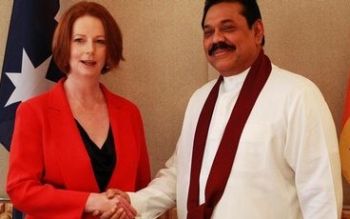 Australian Prime Minister Julia Gillard, left, shakes hands with Sri Lanka President Mahinda Rajapaksa. Sri Lanka's commitment to human rights is troubling, writes Amnesty International. Photo / AP |
(PERTH, Aust.) - A government accused of war crimes, crimes against humanity and numerous human rights violations is set to take control of an organisation of governments representing more than 2 billion people around the world.
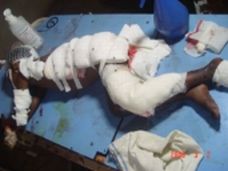 Image of the Tamil Genocide |
Sri Lanka is to pick up the baton from Australia as the next head of the Commonwealth from 2013 to 2015. And most of the governments that make up the 54-member union appear content to let it happen.
They appear content to ignore the Sri Lankan government's record in the closing days of its long war with the Tamil Tigers, and the long list of human rights abuses committed by both sides compiled by Amnesty International and other organisations since hostilities ended. And they appear content to remain quiet as calls for an independent international investigation into alleged war crimes and crimes against humanity committed by all sides grow louder.
More than 300,000 people were trapped by the fighting in the final weeks of the war. Some were herded into government declared "safe zones", only to be deprived of adequate food, water and medical care and systematically bombarded by the army's heavy artillery.
 End Israel's Unwarranted Murder of Kids |
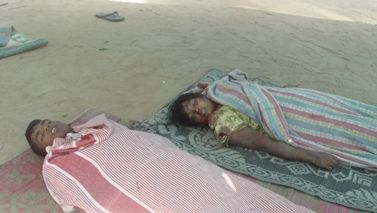 Kids - so many, butchered by the SLA - Sri Lankan Army |
Others were used by the Tigers as human shields or watched helplessly as their children were forced to join the rebel army. Those caught trying to flee were shot. By the end, more than 10,000 of them were dead.
Emerging accounts of atrocities were so severe that United Nations Secretary General Ban Ki-Moon commissioned a panel of experts to advise him on the best way to ensure those responsible for possible war crimes and crimes against humanity were brought to justice.
That panel concluded that there was compelling evidence that serious abuses were committed by both sides and that an independent international investigation was warranted. But the Sri Lankan authorities resisted.
They condemned the creation of the panel and its conclusions and claimed that they had implemented a "zero civilian casualties" war plan, despite all the available evidence to the contrary. It was "a grave assault on the entire regime of international law", in the words of the UN panel itself.
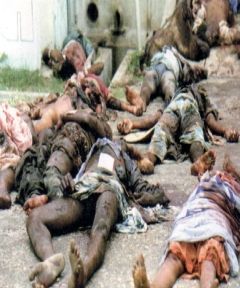 Victims - Sri Lanka Tamil Genocide |
Sri Lanka has a dismal record on human rights. The vast majority of human rights cases reported are never investigated, let alone heard in court. Arbitrary arrests and detentions, enforced disappearances and police torture are common. Media figures and trade union leaders are routinely targeted. And more than two years after the end of the war, thousands remain held without charge in government "rehabilitation camps".
Commonwealth countries share a commitment to basic values including democracy, freedom, peace and rule of law. Allowing Sri Lanka to head the Commonwealth runs contrary to these values and threatens to derail the organisation's commitment to human rights. It tells the world that members of the Commonwealth are willing to ignore grave abuses and injustice when what is needed is committed, global support for an independent international investigation.
As their leaders gathered for the bi-annual Commonwealth Heads of Government Meeting in Perth last month, many Commonwealth members were content to look away, knowing that their next meeting is set to be in Colombo. India remained silent. So did South Africa. And the UK and other key players, both large and small, avoided the issue.
But some countries made their objections known. Prior to the meeting Canadian Prime Minister Stephen Harper came out to say he would boycott the 2013 Commonwealth meeting in Colombo unless Sri Lanka improves its human rights record and will encourage others to do the same.
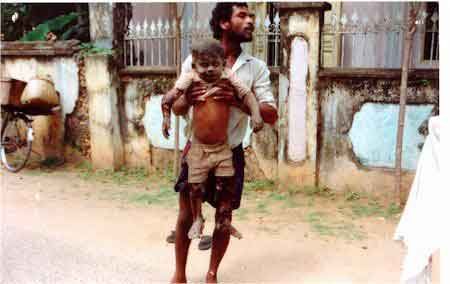 A Tamil father holds the ruined lifeless body of his innocent little boy. |
Canadian opposition members went even further, and have called for Sri Lanka to be suspended from the Commonwealth until alleged perpetrators are properly held to account.
In New Zealand the Government has expressed its concerns about allegations of human rights violations and has urged for a long term and peaceful solution to the long-running conflict in Sri Lanka. In order to make this commendable aspiration a reality, New Zealand must publically advocate the launch of an independent investigation into the violations of the Sri Lankan civil war.
In Australia, politicians from different political parties have raised their concerns and have increasingly called for an international investigation. Police are examining a "war crimes" dossier alleging Sri Lankan Government forces' involvement in war crimes and crimes against humanity, and activists have called on the Australian government to arrest Sri Lankan officials allegedly involved, including the High Commissioner to Australia.
The Commonwealth has a mandate to act on any serious or persistent violations of its values. It is supposed to assess any infringement of these values and recommend measures for collective action. Pakistan and Fiji have twice been suspended in the past. Sri Lanka's position should be reconsidered.
 |
Sri Lanka was passed over for the Commonwealth leadership in 2009 because of similar human rights concerns. Nothing has changed since then. Instead, mounting evidence continues to point to culpability at the highest levels of government.
Sri Lankan President Mahinda Rajapaksa has publicly pledged to stand up to any international power or body that would try to prosecute Sri Lankan "war heroes".
It is up to Commonwealth members to stand up for the tens of thousands of victims of Sri Lanka's civil war and to ensure the Commonwealth's values and commitments to human rights and the rule of law are upheld.
Salil Shetty is the Secretary General of Amnesty International.
Special thanks to the New Zealand Herald
Originally published here: http://www.nzherald.co.nz/world/news/article.cfm?c_id=2&objectid=10763420
 |
 |
Articles for November 2, 2011 | Articles for November 3, 2011 | Articles for November 4, 2011
Quick Links
DINING
Willamette UniversityGoudy Commons Cafe
Dine on the Queen
Willamette Queen Sternwheeler
MUST SEE SALEM
Oregon Capitol ToursCapitol History Gateway
Willamette River Ride
Willamette Queen Sternwheeler
Historic Home Tours:
Deepwood Museum
The Bush House
Gaiety Hollow Garden
AUCTIONS - APPRAISALS
Auction Masters & AppraisalsCONSTRUCTION SERVICES
Roofing and ContractingSheridan, Ore.
ONLINE SHOPPING
Special Occasion DressesAdvertise with Salem-News
Contact:AdSales@Salem-News.com





Terms of Service | Privacy Policy
All comments and messages are approved by people and self promotional links or unacceptable comments are denied.
[Return to Top]
©2026 Salem-News.com. All opinions expressed in this article are those of the author and do not necessarily reflect those of Salem-News.com.